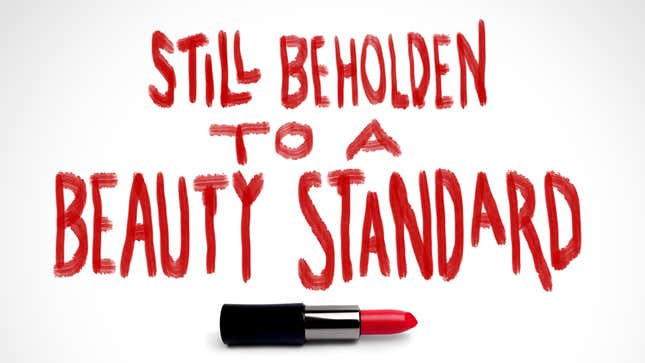Calling a Smidge of Bullshit on the Whole Makeup-Free Thing
Latest

Most of us agree a positive body image is a good thing, but we may not agree on how to cultivate it. That much was evident when Australian website MammaMia launched a well-meaning “Body Positive” campaign on Twitter recently with the #MMbodypositive hashtag, meant to address some troubling statistics they discovered in a body image poll, only to get some mad heckling.
In the site’s first ever annual body image survey, they asked women how they feel about themselves, and the answers were more depressing than an episode of Hoarders:
Eighty per cent of us are unhappy with the way we look.
Sixty per cent think negatively about our appearance at least once a day.
And a whopping 90 percent say that the way we feel about our body has stopped us from doing something in the past 12 months; whether that be going to the beach, having sex or getting our picture taken.
I doubt any of us is immune to these stats at one time or another, and we all know the culprit: being force-fed a steady diet of fictional female bodies that are about as authentic as a newly discovered Vermeer painting. But what is to be done?
MammaMia took a swing at it: They issued a six-part online challenge to readers asking them to expose their insecurities, and they promised to promote and publish them as the alternative to the PhotoShop of Horrors out there — i.e., “real” women’s faces and bodies. Readers are asked to photograph and publish with the hashtag the following:
- 1: Your face without makeup
- 2: Body part you used to hide
- 3: Something you’re proud of your body doing
- 4: “Real” post-baby bodies
- 5: Your face after exercise
- 6: A part of your body once shamed
It all seems harmless enough, but what showed up in my Twitter feed wasn’t a slew of makeup-free faces with the equivalent of a fist-pump of support for going bare. It was a round of retweeted criticism about the ideological hypocrisy of the campaign from a very vocal Australian writer.
There were, of course, readers who happily participated:
And some jokes:
And expansions on the notion:
But clearly, leading the pack of oh-please was Helen Razer, agog at the feminist hypocrisy of this charade:
-

-

-

-

-

-

-

-

-

-

-

-

-

-

-

-

-

-

-

-

-

-

-

-

-

-

-

-

-

-

-

-

-

-

-

-

-

-

-

-








































